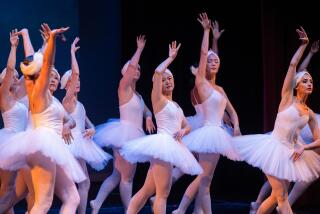Legendary ballerina was a longtime Bolshoi star
- Share via
Natalia Bessmertnova, a legendary prima ballerina with the Bolshoi Ballet for more than three decades, has died. She was 66.
Bessmertnova died Tuesday at a Moscow hospital after suffering from a long illness, company spokeswoman Yekaterina Novikova said. Russian media reported that Bessmertnova had kidney trouble.
Bolshoi director Anatoly Iksanov called her death “a huge loss for the Bolshoi Theater and to our whole culture,” the ITAR-Tass news agency reported.
The dancer was “the pride and glory of the company to which she devoted her entire life,” he was quoted as saying.
Bessmertnova danced with the Bolshoi from 1961 until 1995, when she and other performers staged a one-night strike after Yuri Grigorovich, her husband and the company’s artistic director, quit after 30 years at the helm during a dispute with management amid plans for his replacement.
Their refusal to dance “Romeo and Juliet” reportedly caused the first cancellation in the company’s history of more than two centuries.
Grigorovich, a former Kirov Ballet character dancer, had become notorious for promoting the careers of his wife and other favorites, some said to the detriment of other dancers. But in Bessmertnova’s case, at least, her formidable talents justified her special position.
Critics noted how her sylph-like figure, long arms and legs and poetic expressivity made her ideal for such romantic roles as Giselle. At the same time, she possessed a nervous energy, impulsiveness and mercurial emotions that could be exploited in more contemporary works.
Reviewing a performance of Grigorovich’s “Spartacus” at the Shrine Auditorium in 1979, Los Angeles Times dance critic Lewis Segal wrote of Bessmertnova: “Only Maya Plisetskaya, in films of a previous version of ‘Spartacus,’ has shown us such interpretive individuality wedded to such technical power.
“No detail in her dancing seemed to be emphasized for mere effect, yet spectators all evening long found themselves applauding her shimmering bourrees, serene balances and brilliant leaps. With reason.”
Even Bessmertnova’s dancing in later years mesmerized audiences and critics.
Reviewing her performance in Mikhail Fokine’s “The Dying Swan” in 1993, Washington Post critic Alan M. Kriegsman wrote: “Bessmertnova, without mannerism or histrionics of any sort, danced it as a somberly reflective elegy, a song of the pain of morality. You were afraid to blink, to miss any of its nuance or telling simplicity.”
Bessmertnova was born July 19, 1941, in Moscow to a doctor and a homemaker.
She showed an early interest in dance and soon displayed talent to match, joining the Bolshoi immediately after graduating from the theater’s school in 1961, one of the highest achievers in the school’s history.
Two years later, she made her solo debut as Giselle, creating the title role in Mikhail Lavrovsky’s production and launching herself as a truly romantic dancer.
She went on to dance all of the leading roles in the Russian classical repertoire -- “Swan Lake,” “The Fountain of Bakhchisarai,” “Don Quixote” and “Romeo and Juliet,” in particular. But she was equally adept in the more robust theatrical works choreographed for her by her husband, including “Legend of Love,” “Spartacus,” “Ivan the Terrible” and “The Golden Age.”
Bessmertnova was a gold medalist at the prestigious Varna International Ballet Competition in 1965 and was awarded France’s Pavlova Prize in 1970.
She was named a People’s Artist of the U.S.S.R. in 1976 and was a laureate of the Soviet Union’s Lenin Prize and Stage Prize. She was put on a company pension in 1989 and left the Bolshoi in 1995.
In recent years, she had worked with Grigorovich on such projects as the Benois de la Danse Prize, for which he served as chairman of the jury.
In addition to her husband, Bessmertnova is survived by a sister, Tatania, and a nephew, Mikhail, who also were dancers.
A public funeral will be held Friday at the Bolshoi, the theater said.
--
More to Read
The biggest entertainment stories
Get our big stories about Hollywood, film, television, music, arts, culture and more right in your inbox as soon as they publish.
You may occasionally receive promotional content from the Los Angeles Times.










